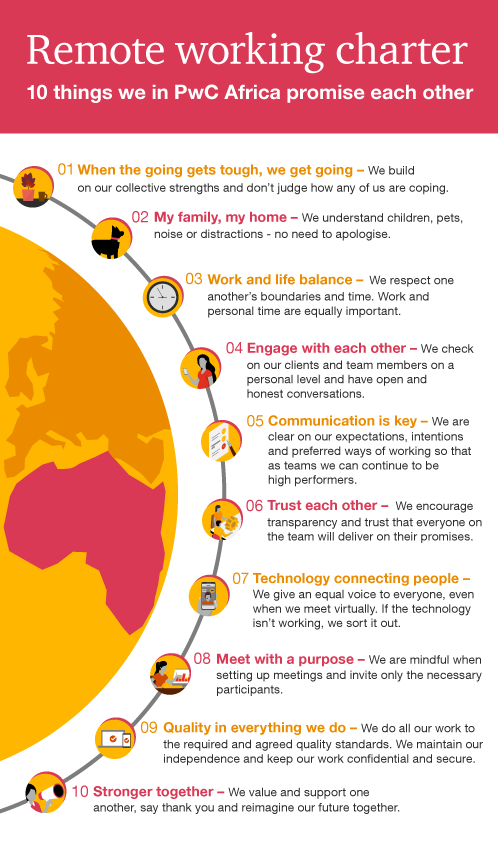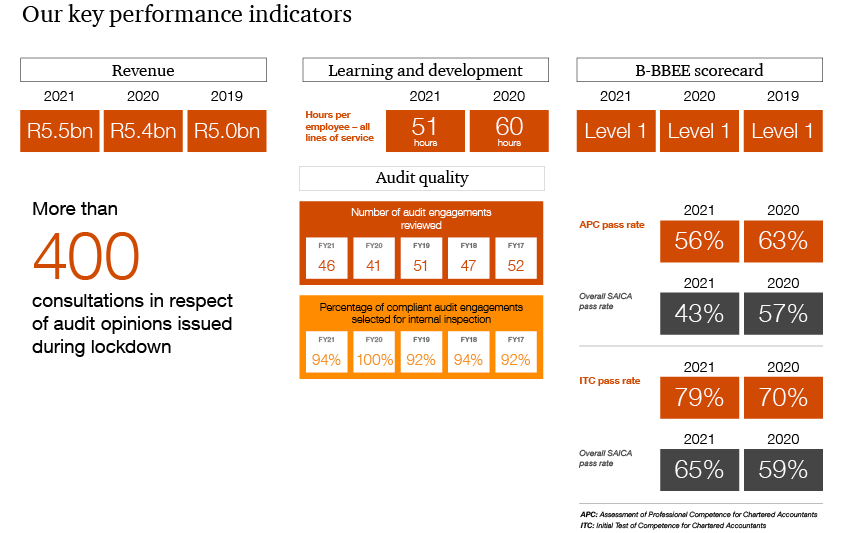Our purpose of building trust in society and solving important problems, and at the same time delivering sustained outcomes, is becoming a golden thread that runs through all of our people's initiatives.
Apart from The New Equation, the wellbeing, safety and development of our people have always been at the heart of everything we do – more so than ever over the past two years. We constantly seek to grow and engage our people, and acknowledge the difference they make by:
- creating a supportive, positive, flexible work environment;
- agreeing expectations upfront and managing performance continuously to ensure that everyone knows what’s required to meet our goals;
- developing and coaching our people by providing learning and exposure opportunities tailored to their individual needs, and the changing PwC requirements, which will equip them to be successful in the new world of work;
- ensuring we have the necessary skills to perform the work we do, at the quality required;
- supporting the wellbeing of all of our people;
- rolling out The New Equation strategy throughout Africa, to ensure that our people understand their role and contribution as part of our community of solvers.
Creating a supportive, positive, flexible work environment
Flexibility has been part of our culture for a number of years, but with the COVID-19 lockdown, our investments in technology enabled all 5,400 of us to shift to home working overnight. But more than just enabling us to work differently, technology played a crucial role in connecting our teams and enabling us to support one another in a new way.
We want everyone to feel included, supported and safe in the work environment. Due to the pandemic, we took a decision, globally, to postpone our annual Global People Survey scheduled for FY20, to FY21. In 2021, 82% of our staff and partners in South Africa participated in the survey, and the results positively showed that despite the disruption experienced in 2020/2021, a higher proportion of our people rated their work experience more favourably.
We observed increased favourability across key indicators of our people experience, including our people engagement index (78%), which focuses on value alignment (84%), pride to work at PwC (89%), keenness to recommend PwC as a great place to work (72%) and belonging (70%). The majority of respondents also expressed satisfaction with the quality of our technology (90%), resources provided to work well remotely (97%), growth and development, and aspects of diversity and inclusion. Our people also indicated a need to continue to improve our efforts in certain areas, particularly in how we prioritise wellbeing and flexibility, how we reward and recognise our people and the need to provide even more opportunities for staff across levels to connect more with leaders - the latter was understandable in light of our changing way of working.

Our Deal
We continue to invest in programmes to help our people to work flexibly and manage their energy and personal wellbeing so they can be their best selves at home and at work. For instance, we introduced a new initiative - Our Deal - where our leaders and our people agree on how and when we work (empowered flexibility), how we develop and improve (how we grow), how we are recognised and rewarded (how you are valued) and living our purpose and what we do (how you make a difference).
Agreeing expectations and managing performance
At PwC, every employee has a team leader and a coach to support them in the delivery of their work, their development needs, and wellbeing. All of our people are expected to set annual goals agreed with their team leader and coach and to obtain continuous feedback on their performance and development areas.
We’ve invested significantly in technology to digitally enable our people to receive real-time feedback that’s focused on improving their skills and performance. Digital tools used for this include Snapshot and Workday.

Snapshot captures feedback on work and assesses progression against the five dimensions of the PwC Professional framework, identifying development actions where appropriate and highlighting examples of differentiated performance. Our people are expected to obtain continuous feedback throughout the year. During FY21, 28 321 snapshots were completed by our people.

Workday, our cloud-based global people management system, is used to capture and track progress on our performance goals.
Feedback is a key element of our annual appraisal process. Partners and staff assess their performance against agreed goals and against relevant skills and capabilities based on the PwC Professional framework. The appraisal process covers technical competence and quality, but consideration is given not only to what an individual has achieved, but also how it was achieved. We continue to focus on the contribution and impact our people make on each other, our clients and society.
Our top performers have the opportunity to progress faster and to receive higher reward and recognition through guaranteed compensation and incentives. Our people who perform below expectation are supported to improve, and where performance is unsatisfactory, corrective action is taken.
We were grateful to be able to recognise our people after a challenging 18 months. In July 2021, we awarded annual salary increases to all our qualifying people, promoted everyone who was ready, paid out bonuses to those who qualified, and paid an extra week’s compensation to all our people.

Developing and coaching our people
We develop our people through a combination of on-the-job experience, coaching and formal learning programmes. As mentioned, each person in PwC is assigned a team leader and a coach. We have 1 419 coaches and 578 team leaders in PwC South Africa. Team leaders care for and manage between 10 and 15 people. Coaches are responsible for assisting their coachees with career planning, development and the opportunity to learn from others using discussion and exchange. We have made significant progress with the coaches from our Advisory and Assurance lines of service, with most of them completing our Coaching Lounge training on the principles of performance coaching.
As part of our transformation strategy, our talent activation programme is designed to support high-performing African, Coloured and Indian (ACI) talent. Participants team up with senior partners who provide them with additional exposure to business opportunities, mentoring, advocacy and teaming. Currently, 125 senior managers and associate directors are enrolled.
Our vision is to develop leaders who have the skills, opportunities and confidence to lead in our increasingly diverse, complex and interconnected world. The results of the programme were evident in the high percentage of partners and associate directors who were promoted from the pool of engagers. In 2022 the programme will be expanded to include our managers.
After a pilot with our graduate programme trainees and extensive consultation with the PwC leadership team, we introduced a revolutionary development and assessment tool to the firm. Through an artificial intelligence (AI) and gamified video-enabled digital tool, we have access to real-time data and information on all of our potential leaders in the firm. Guided by external industrial psychologists and executive coaches, our people can focus on areas of development and understand their preferences, strengths and team dynamics within the PwC Professional context, helping them to plan and measure their own development and contribute to our community of solvers.
We are focused on supporting our people on their personal learning journey and have created a range of opportunities for them to develop the technical, digital, business and leadership skills they will need, to be able to work at their best in the new world of work.
Our people have access to a number of formal training opportunities, which are delivered in different formats. These include modularised face-to-face, virtual classroom, elearn and blended learning. Our global network’s learning management system, Vantage, houses all our formal and informal learning. Vantage consists of thousands of curated self-paced learning assets from some of the globe’s top learning institutions, including TED and Harvard Business Review, and has collaborative learning functionality that enables our people and their teams to create and share learning that is relevant to them. All our local training interventions are also loaded onto Vantage for easy access for our staff. Our access to high-quality global programmes, which we tailor for our specific market, enables our workforce to develop skills that support mobility across Africa, as well as the rest of the world.
During the year, our firm invested R84.5 million in skills development for all staff. Employees each received an average of 74 training hours per annum. We invested R20.2 million towards the formal education of our workforce in the form of bursaries.
With the COVID-19 pandemic continuing in 2021, we continued to innovate and use our technologies to run our training virtually so that our people could continue on their learning journeys. Google Classroom, Jamboards, Meet and Webcast were some of the technologies we leveraged. We held regular virtual webcasts, upskilling our people on many different topics around audit methodology, risk assurance, accounting technical and more. On average, 822 staff members across South Africa attended each session. Our people attended 315 353 hours of virtual training (virtual classroom and online training) in FY21, with an average of 51 hours per person.
We have continued our digital upskilling journey, offering all our people intermediate level training in data analytics, visualisation, and robotic process automation, as well as regular digital events and meetups supplemented by curated learning assets that are available on Vantage. In FY21 we also started offering advanced courses on data analytics and visualisation. In FY21, 2195 staff members in South Africa completed some form of digital upskilling. Our staff completed an average of eight hours of digital training each for the year.

In FY21 we launched the Digital Accelerator Programme. In this programme, selected individuals underwent in-depth training in areas such as G Suite and Apps Script, cloud platforms such as GCP, Azure and AWS, exposure to fundamentals of AI, change management, design thinking and a Udacity nanodegree in business analytics. Our first cohort of 24 candidates graduated on 30 June 2021. The second cohort kicked off on 15 March 2021.We are particularly proud of our learnership and graduate programmes that supported the learning of the approximately 430 graduates who joined us at the beginning of 2021.
We offer the following learnerships and graduate programmes:

Core Assurance curriculum and SAICA learnership
We offer our Core Assurance trainees an opportunity to complete their SAICA learnership in the Audit elective. This opportunity is highly rated in the industry, and we attract a large number of audit trainees (approximately 1,500 for 2021). Our trainees consistently achieve above-average pass rates in their professional exams. The PwC APC pass rate for November 2020 was 56% (overall SAICA: 43%). The PwC African, Coloured and Indian pass rate was 45% (overall SAICA: 32%). Our PwC female pass rate was 51% and PwC contributed 18% to the overall SAICA APC passes.
The PwC Initial Test of Competence (ITC) pass rate for the combined January 2021 assessments was 79% (overall SAICA: 65%). Our ACI pass rate was 69% (overall SAICA: 56%), our female pass rate was 78%, and we contributed 16% of the overall SAICA ITC passes.
In supporting our trainees to develop their technical, digital and business skills during their learnership, we provide a core Assurance curriculum consisting of formal training, gamified learning and simulations that guide trainees through the development of their audit competence. This programme is run over three years and trainees progressively develop the skills needed to become an audit manager.
Core Assurance - Audit Development Programme
The Audit Development Programme (ADP) provides an opportunity for specialisation by professional accountants who intend to practice as registered auditors (RAs). This minimum 18-month programme requires a Registered Candidate Auditor to work under the supervision of an Oversight Registered Auditor while compiling their portfolio of evidence in support of their registration. In FY21, 11 managers registered for the ADP.

Excellence Academy
In 2021 we welcomed 46 new graduates to our Risk Assurance Excellence Academy that prepares new joiners to our Risk Assurance practice for the work environment . The academy is an intensive four-week training programme and consists of two-weeks’ induction and business skills training and two weeks of technical skills training, including IT audit and internal audit simulations.

Foundation for the Future
Foundation for the Future is an 18-month graduate programme that takes a multi-disciplinary approach to on-the-job learning at the entry level of our Advisory business. Our associates have varying qualifications, including honours and master’s degrees in sciences, technology disciplines, mathematics and statistics, engineering (industrial, chemical, electrical, mechanical), business (management, finance, investments, risk), industrial psychology and human resource management, law and health sciences. Additionally, we introduced our Youth Empowerment Accelerator in 2020, with candidates sourced through Harambee and Yes4Youth.
In addition to skills diversity, the programme also boasts gender and ethnic diversity and brings fresh, youthful ideas and energy into the organisation. In January 2021 we welcomed another 44 new graduates into our Foundation for the Future programme.
Associates are expected to rotate through six selected business units, gaining critical skills. In addition to technical consulting skills, associates are also encouraged to upskill themselves digitally.
At the end of the 18 months, associates are expected to graduate from the programme and are offered permanent employment based on our business needs.
Deals - EMEA graduate programme
The Edge programme supporting our Deals business strategy is a four-year graduate programme that is offered across our Europe, Middle East and Africa (EMEA) region. It aims to attract, develop and retain a new generation of diverse, technology savvy, well-rounded and well-networked graduates into our business.
One of the highlights of the programme includes an International Deals Foundation Event (IDFE) in Madrid that aims to bring the Deals lifecycle to life, while helping participants build an international peer network.
Edge participants benefit from local and international onboarding activities and are required to rotate through at least three Deals competencies during the four years. Top performers can take advantage of a six-month international exchange opportunity to a country where PwC has a Deals presence.
Diversity of skills, gender and race are key to the programme, with 64% of the South African participants being female and 77% being African, Coloured or Indian.
During the four-year programme, it is expected that Edge participants achieve either a CFA or CIMA professional qualification aligned to the business unit in which they will ultimately be placed. Edge participants graduate from the programme with a PwC Advanced Certificate in Deals.

Tax professional learnership
We offer a learnership to future tax professionals through the South African Institute of Tax Professionals (SAIT).
Thirty-three of our trainees are currently enrolled in this learnership. The trainees rotate throughout the practice and gain exposure to various specialisms. We provide support to the learners through mentoring and training, both formally and on the job, and financial support for their preparatory courses and the qualifying exam fees.
A further eight trainees are currently completing their tax learnership through the South African Institute of Chartered Accountants (SAICA). These trainees rotate between our Tax and Assurance businesses while pursuing their qualification as chartered accountants.
Ensuring we have the right people and resourcing to perform the work we do, at the quality required

The New Equation
Our vision for the PwC network, fuelled by our purpose, is to be the most trusted and relevant professional services business in the world – one that attracts the best talent and combines the most innovative technologies, to help organisations build trust and deliver sustained outcomes.
The implementation of TalentLink as a scheduling and resource management tool enhanced our ability to plan and monitor the utilisation of our diverse skill sets.
The result of these tools was better planning and utilisation of our talent and being able to proactively engage with the talent acquisition process.
During the financial year, we appointed and onboarded over 800 experienced employees to the firm. In January 2021, our graduate recruitment team appointed 645 trainees to start their journey at PwC.
Our Talent Acquisition team has fully embraced LinkedIn and successfully placed in excess of 60% of their placements through the platform. This has given the team the capability to effectively fill all resource requirements, by means of advertising, target sourcing and headhunting.
We received the following accolades:
South African Graduate Employers Association (SAGEA) is a not-for-profit professional association dedicated to connecting and advancing graduate employment. They represent over 300 individuals across more than 175 organisations. SAGEA raises awareness of and regard for the graduate recruitment and development profession, enhancing the careers of those involved in it.
SAGEA runs an annual Candidate Insights Survey of 2,256 new or future employees from 80 organisations during March to June. The survey provides SAGEA members with the very latest information on:
- candidate applications;
- job-hunting techniques;
- factors that influence application decisions; and
- future plans of candidates.
In the most recent annual awards based on the Candidate Insight Surveys, PwC won the following categories:
Recruitment Accolades

Supporting the wellbeing of our employees
The sudden move to remote working has brought challenges that none of us had to deal with before. In response to our people asking for support on how to navigate their work, wellbeing and finding balance in the new world of work, we launched our remote working charter for PwC Africa, which articulates 10 promises we make to each other in working remotely.
We also had regular firmwide webcasts with leaders, videos by our People Leader and coffee chats with our people - all focused on reassurance, transparency and helping each other through situations that none of us had ever experienced before. We also leveraged our team leader structure to personally engage with our people, keep them motivated, and demonstrate care, which is one of our core values. Team leaders personally checked in on employee wellbeing, but also ensured that our people maintain their sense of purpose.
Our wellbeing support included virtual talks by psychologists and other professionals covering topics arising from the COVID-19 uncertainty. These included managing and responding to uncertainty and panic, building virtual relationships, support for working parents, financial management, mental health awareness and virtual gym sessions. These sessions were attended by 3 122 of our people in FY21.
In addition, we’ve also provided support to prospective employees. To help students to cope better with the virtual world, we hosted a series of webinars with topics ranging from coping with uncertainties, to personal branding, the impact of technology on audit and a brief introduction to PwC. These webinars have been popular, attracting over 1 000 students from across the country.
Our employee assistance programme was also extended to provide support to students who will join us after their studies. We hosted webinars to assist the students to deal with uncertainty, adjusting to an online learning mindset, adjusting to study in new living conditions, identifying mental triggers and red flags, being calm in the face of uncertainty, facing the academic year with confidence, dealing with stress and remaining focused and motivated. Over 300 signed students attended these wellness workshops offered by PwC.








Contact us

Verena Koobair
Head of Communications and Societal Purpose Firm Pillar Lead, PwC South Africa
Tel: +27 (0) 11 797 4873






















